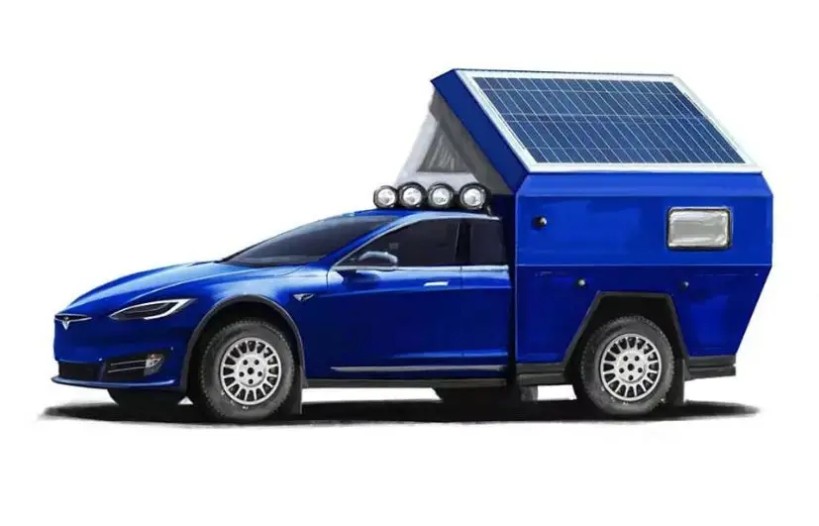Electric camper vans are what everyone is talking about right now. Whether it’s moving away from fossil fuels, living greener or trying to reduce your carbon footprint, the variety of vehicles you can choose to live eco-consciously in is increasing by the week. So far we’ve seen some great examples, like this Tribrid Eco Explorer with a 1,000 mile range, and the all-electric T6 Multivan from Volkswagen, but the latest in electric campers isn’t a traditional camper at all… It’s a Tesla.

The Roamer mini camper van is a prototype concept based on a Tesla Model S and dreamt up by entrepreneur, globe-trotter and Twitch video host Travis Rabenburg, who plans to develop and build his electrically-powered creation this year before driving it from England to Dubai for the 2020 World Expo in the name of sustainable travel.
As if his plan wasn’t bold enough, Travis also hopes to set a new Guinness World Record for the fastest electric camper van with a target top speed of 150mph. In fact, if he can achieve this, it would set a record for the fastest camper van full stop, as the current record holder is a custom Fiat Doblo which attained speeds of 141.3mph (227.35km/h). Hopefully Travis remembers to pack his pots and pans away before he sets off.
So how will the Tesla create all of the power necessary to set a world speed record?
Well, the Model S 70D base features an electric powertrain capable of delivering up to 309bhp (230kW)- that’s 406 lb-ft (550Nm) of torque, giving it an impressive 0-60mph time of just 5.2 seconds.

One of the more intriguing aspects to Tesla’s car design is the free software updates that are transmitted to the vehicle over Wi-Fi while it’s parked up at night, improving its speed, economy or just fixing bugs. It’s not clear yet what pieces of technology will be transferred over to the Roamer, or indeed how you would even go about converting an electric sedan car into a camper van, but don’t expect to get any hints from Travis Rabenburg who’s keeping his project details tightly under wraps for now.
What we do know is that the camper box prototype will have floorspace dimensions of 8” x 6” (2.4m x 1.8m) and will measure 4ft (1.2m) high when the roof is unpopped with a standing height of 6.6ft (2m) when popped.

The Roamer will sleep two and include a toilet, sink and a bed. While details are scarce right now, we do know that it will include storage for 20 gallons (76 litres) of water and a 350W solar system that encompasses the entire roof. The pop top can either sit flat, be popped at an angle or all the way up to increase standing room, and large vents all around the sides will provide ventilation. The concept drawing also hints at big spotlights mounted to the vehicle’s roof, and meaty off-road tires.

Right now competition in the electric camper market is fierce, as companies are constantly trying to one-up each other with ever-increasing ranges, the only main drawback that is preventing electric from replacing fossil fuel altogether. The Tesla Model S, although not strictly a van, could well sit at the top of the current market with an impressive range of 200 miles (322km), meaning you can drive for longer between charges.
Although it does look a bit like a snail, and we can’t honestly say that the sleek Tesla car front marries well with the camper box on the back, this is nevertheless an exciting concept for eco-conscious van lifers and millennials who enjoy the cutting edge of technology. While the electric camper van market is rapidly growing, this kind of new technology doesn’t come cheap, but perhaps the Tesla Model S Roamer will encourage others to undertake their own electric vehicle camper van conversions and make way for a cleaner, greener future in the vanlife community.
Source: Travis Travels





